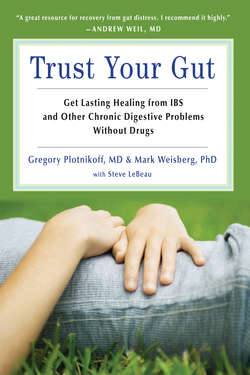Читать книгу Trust Your Gut - Gregory Plotnikoff - Страница 37
На сайте Литреса книга снята с продажи.
Take Action
ОглавлениеNot all patients find relief from their symptoms as quickly as Bill did. But practically all of our patients do experience relief and an improved sense of control over their symptoms by learning to notice and observe the sensations in this passive way. Ironically, they're learning to control their symptoms more by not trying to control their symptoms at all.
As a little experiment, just take a minute or two right now to focus on a sensation somewhere in your stomach or abdomen. Just imagine that you're going to pull a chair up to it and simply observe it. Don't try to change it, fight it, or make it relax. Just let that sensation in your abdomen be there exactly the way it is. If it stays the same, that's fine. If it moves, changes location or intensity, that's fine, too. Just be curious to notice what happens without you trying to change it in any way. Afterward, jot down on a piece of paper what you observed.
As you practice this skill and gain experience with it, your brain and nervous system will learn that these sensations are not threats. You will begin to feel the sensations diminish in intensity. What's more, you'll find that the anxiety, dread, and muscle tension associated with those sensations will also diminish. You will feel better and calmer, and you can then begin the process of actually listening to what the sensations are trying to convey.
You may be put off by this whole idea. You might be thinking, Why on earth would I want to make room for and accept sensations that I hate so much? I want to fight that sensation with everything I've got! This is a common reaction to something that seems counterintuitive. Skepticism is normal. As one of our patients said at this stage, “No offense, Doc, but are you crazy? This pain in my gut has taken over my life in every way. The last thing I want to do is pay any more attention to it. I'd rather stick my finger in an electric socket.”
We are biologically predisposed to be alarmed when we feel something painful or unusual in our body, especially when it's new. This is meant to protect us from harm. If you accidentally put your hand over a flame, that natural alarm activates a signal in your brain to pull your hand away as quickly as possible. You don't just watch it. If you suddenly notice pain or pressure in your chest with pain radiating down your left arm, you should not simply make room for that sensation. Instead, start calling 911! Similarly, if you experience new abdominal symptoms of pain, pressure, bloating, and diarrhea and have not seen a physician, you should definitely call now for an appointment.
However, if your symptoms have become chronic—and you have already been medically examined and tested—then the alarm function is not needed. It's a false alarm. The mix-up is that your more primitive, reflex-level limbic brain never got the memo. Unfortunately, most people still react with alarm, anxiety, or panic when they feel that all too familiar discomfort in their gut. Calmly observing those sensations helps to short-circuit the primitive brain.
At first, it may feel awkward or scary to observe your gut symptoms with a sense of passive curiosity. But we want to assure you that it is perfectly safe. We will be with you through this process, step-by-step, to help you master these new empowering skills. Over time, it will help you feel relief and gain more control over your symptoms.
